
Theodoros Natsinas (Greek : Θεόδωρος Νάτσινας; 8 July 1872 - 2 February 1949) was a Greek teacher. He was born in Siatista (Greek : Σιάτιστα), then part of the Ottoman Empire, now in Greece.

Theodoros Natsinas (Greek : Θεόδωρος Νάτσινας; 8 July 1872 - 2 February 1949) was a Greek teacher. He was born in Siatista (Greek : Σιάτιστα), then part of the Ottoman Empire, now in Greece.
He studied Physics and Mathematics at the University of Athens, where he received his degree. After the completion of his studies in 1898, he taught at secondary schools in Argos and Spetses. [1] In 1899, the University of Athens proposed to the Greek Government that he should be posted as a teacher at Kayseri in Turkey on a "national" mission to support the local Greek population. From 1903 to 1907 he taught at Constantinople.

At 1907 he served as director of a school in Siatista and took part in the Greek Struggle for Macedonia. He was arrested by the Ottoman authorities and taken to nearby city of Lapsista in West Macedonia. He was released after the intervention of the Greek Bishop of Sisanion and Siatista.
In the interwar years, after West Macedonia became part of Greece, he taught in Kozani, [2] founded the first Agricultural Cooperative there, and helped to set up the first Scouts team in West Macedonia. In 1918 he was appointed general Superintendent of Secondary Education of Greece.
In politics he was a supporter of the Liberal Party of Eleftherios Venizelos.

After 1921 he worked in Thessaloniki. Initially, together with a partner, G. Karantanis, they took over the management of a school established by Stefanos Noukas (the Marasleia School). [3] At first, the school was known as the Natsinas - Karantanis School, but, subsequently, after the two partners split, the school was renamed the Theodoros Natsinas School.
He was one of the founding members of the Society for Macedonian Studies. [4]
He had one daughter and three sons: Sultana Natsina, the Lieutenant General Alexandros Natsinas, the creator and first Director (1953–1963) of the Greek Central Intelligence Service, the politician Stefanos Natsinas, and Leandros Natsinas who studied civil engineering at Ghent, Belgium.
He is the author of the book "Macedonian Itinerant Merchants in the Countries of Austria-Hungary" (first edition 1939).

The municipality of Thessaloniki honored him by naming a city street after him.
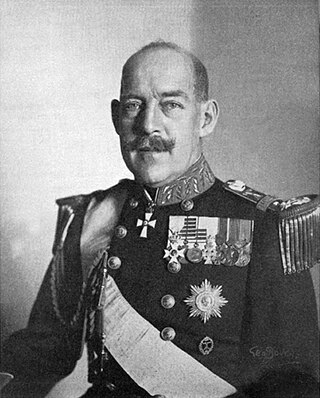
Constantine I was King of Greece from 18 March 1913 to 11 June 1917 and from 19 December 1920 to 27 September 1922. He was commander-in-chief of the Hellenic Army during the unsuccessful Greco-Turkish War of 1897 and led the Greek forces during the successful Balkan Wars of 1912–1913, in which Greece expanded to include Thessaloniki, doubling in area and population. He succeeded to the throne of Greece on 18 March 1913, following his father's assassination.

Eleftherios Kyriakou Venizelos was a Greek statesman and a prominent leader of the Greek national liberation movement. He is noted for his contribution to the expansion of Greece and promotion of liberal-democratic policies. As leader of the Liberal Party, he held office as prime minister of Greece for over 12 years, spanning eight terms between 1910 and 1933. Venizelos had such profound influence on the internal and external affairs of Greece that he is credited with being "The Maker of Modern Greece", and is still widely known as the "Ethnarch".

Siatista is a town and a former municipality in Kozani regional unit, Western Macedonia, Greece. Since the 2011 local government reform it is part of the municipality Voio, of which it is the seat and a municipal unit. It lies 28 kilometres southwest of Kozani. The municipal unit has an area of 158.524 km2, the community 94.426 km2. The 2011 Greek census recorded 5,490 residents in the town and 6,247 in the municipal unit. It was built on the austral slope of the Velia mountain on an (average) height of 930 metres.
Evripidis Bakirtzis, born in Serres, Ottoman Empire, was a Hellenic Army officer and politician. Dismissed from the army twice due to his participation in pro-republican coup attempts and sentenced to death, later during the Axis Occupation of Greece, in World War II he co-founded the National and Social Liberation (EKKA) resistance group along with Dimitrios Psarros and was the military head of the organization. He later joined and was a prominent member of the National Liberation Front (EAM) and its military wing the Greek People's Liberation Army (ELAS). He served as head of the Political Committee of National Liberation (PEEA), a government of Greek Resistance-held territories also called the "Mountain Government", from 10 March to 18 April 1944. He was nicknamed "the Red Colonel", from his pen name in the newspaper of the Communist Party of Greece, the Rizospastis.

The National Schism, also sometimes called The Great Division, was a series of disagreements between King Constantine I and Prime Minister Eleftherios Venizelos regarding the foreign policy of Greece in the period of 1910–1922 of which the tipping point was whether Greece should enter World War I. Venizelos was in support of the Allies and wanted Greece to join the war on their side, while the pro-German King wanted Greece to remain neutral, which would favor the plans of the Central Powers.

Themistoklis Sofoulis or Sophoulis was a prominent centrist and liberal Greek politician from Samos Island, who served three times as Prime Minister of Greece, with the Liberal Party, which he led for many years.
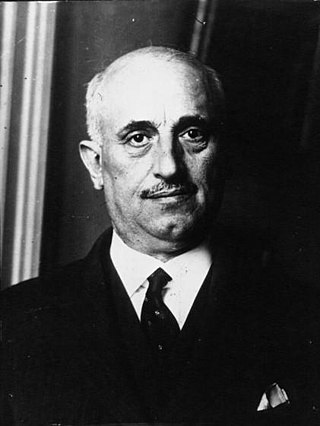
Alexandros Papanastasiou was a Greek lawyer, sociologist and politician who served twice as the Prime Minister of Greece in the interwar period, being a pioneer in the establishment of the Second Hellenic Republic.
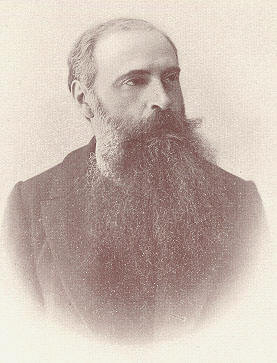
Stefanos Skouloudis was a Greek banker, diplomat and the 34th Prime Minister of Greece.

Spyros Spyromilios was a Greek Gendarmerie officer and guerilla fighter who took part in the Greco-Turkish War of 1897, the Greek Struggle for Macedonia, and the Balkan Wars. In 1914 he proclaimed the Autonomy of his native town, Himarra, and joined the autonomist struggle of Northern Epirus against its inclusion within the newly established Principality of Albania.

The Noemvriana of December [O.S. November] 1916, or the Greek Vespers (after the Sicilian Vespers}, was a political dispute which led to an armed confrontation in Athens between the royalist government of Greece and the forces of the Allies over the issue of Greece's neutrality during World War I.

Lambros Koromilas was a Greek economist and diplomat, and one of the leading figures in the Macedonian Struggle during his tenure as Greek Consul-General to Thessaloniki in 1904–1907. He also served as Finance Minister in 1910–1912 and Foreign Minister before and during the Balkan Wars of 1912–1913.

Georgios Streit was a Greek lawyer and professor. A legal advisor to King Constantine I, Streit was Minister of Foreign Affairs from 1913–14, on the eve of World War I. Later, he served as a Judge at the Permanent Court of Arbitration in the Hague after 1929.
Konstantinos Raktivan was a Greek jurist and politician, who served as cabinet minister, as the de facto first Governor-General of Macedonia, president of the Athens Bar Association and of the Council of State, Speaker of the Hellenic Parliament and member and president of the Academy of Athens.
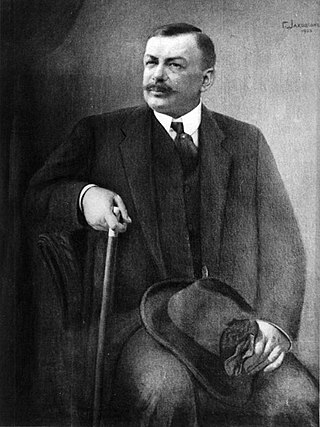
Dimitrios Kalapothakis was a Greek-American journalist, diplomat, translator, foreign correspondent, author, playwright, and founder of multiple Greek newspapers. He was a prominent member of the Evangelical church in Greece. He founded the Greek newspaper Empros. Dimitrios was from a prominent Greek American family his father was a well-known author and doctor Michael D. Kalopothakis. Both his sisters became very important Maria Kalapothakes was the first female doctor in modern Greece. His other sister Dafne Kalapothakes became a well-known archeologist. Their father owned a publishing company that published many different publications in Greece. Dimitrios and his father helped found the Hellenic Macedonian Committee. Dimitrios played a critical role in the Paris Peace Conference. He wrote an important book entitled Greece Before the Conference. The book attracted the attention of Eleftherios Venizelos who appointed Dimitrios Director of the Press Bureau, to the Ministry of Foreign Affairs for over eleven years.
Efthymios Tsimikalis was a Hellenic Army officer who rose to the rank of lieutenant general. He was particularly notable for this role in World War I and in the politics of the interwar period in Greece.
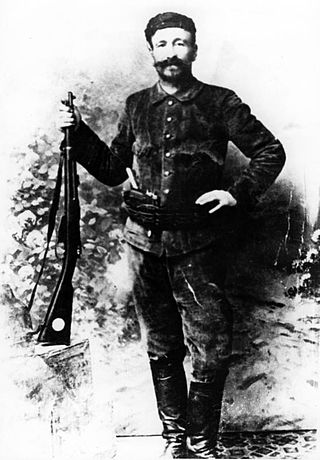
Efthymios Kaoudis was a Greek revolutionary and the leader of the first Cretan armed group in Macedonia, during the Macedonian Struggle.
Theodoros Varopoulos was a Greek mathematician, and a mathematics professor at the University of Athens (1929–1931) and at the Aristotle University of Thessaloniki (1931–1957).
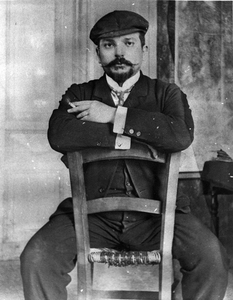
Georgios Kakoulidis was a Hellenic Navy officer, who served as Chief of the Hellenic Navy General Staff, and later became a politician.

Emmanouil Repoulis was a Greek journalist and Member of Parliament. He was elected three times: 1899, 1905, 1923 and was one of the deputies of the so-called 'Japanese Group' under Stefanos Dragoumis. He became deputy leader of the Liberal Party. Appointed Secretary General of the Ministry of Finance, Gevernor-General of Macedonia, Deputy Prime Minister, Minister for the Interior and Minister of Finance.